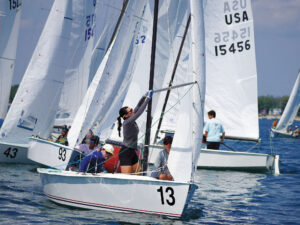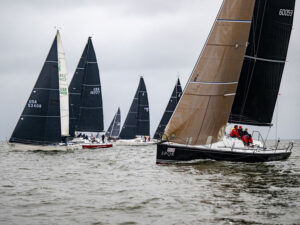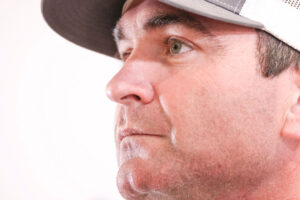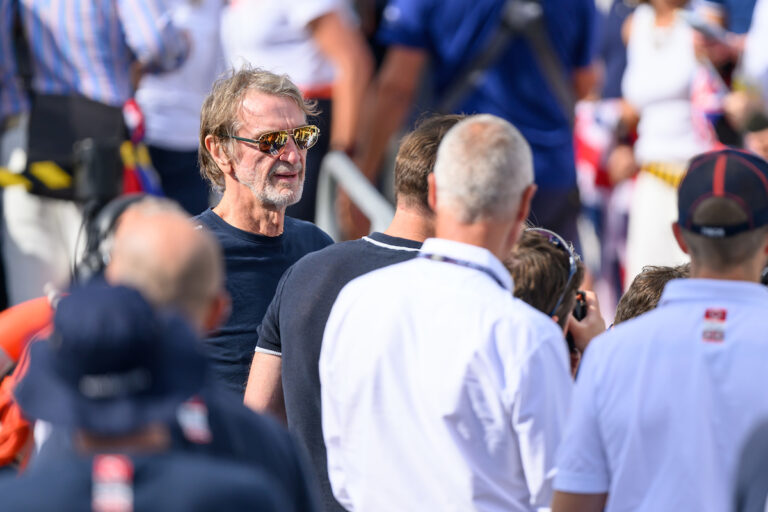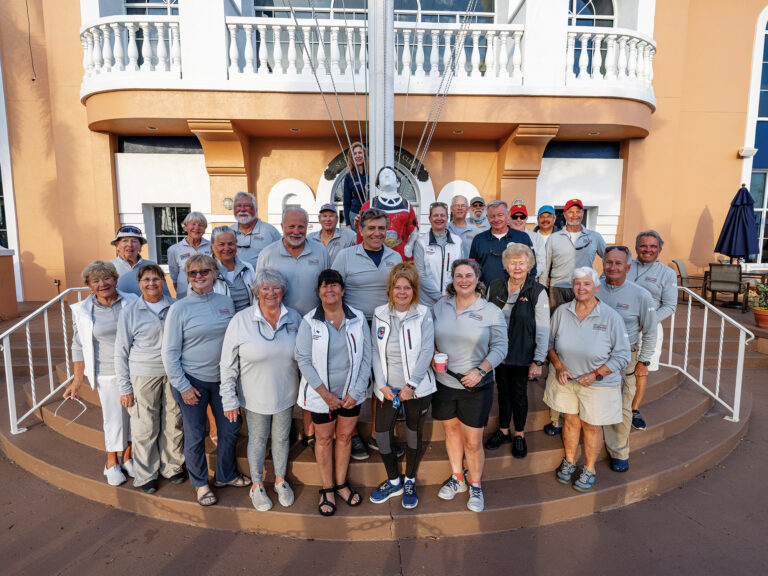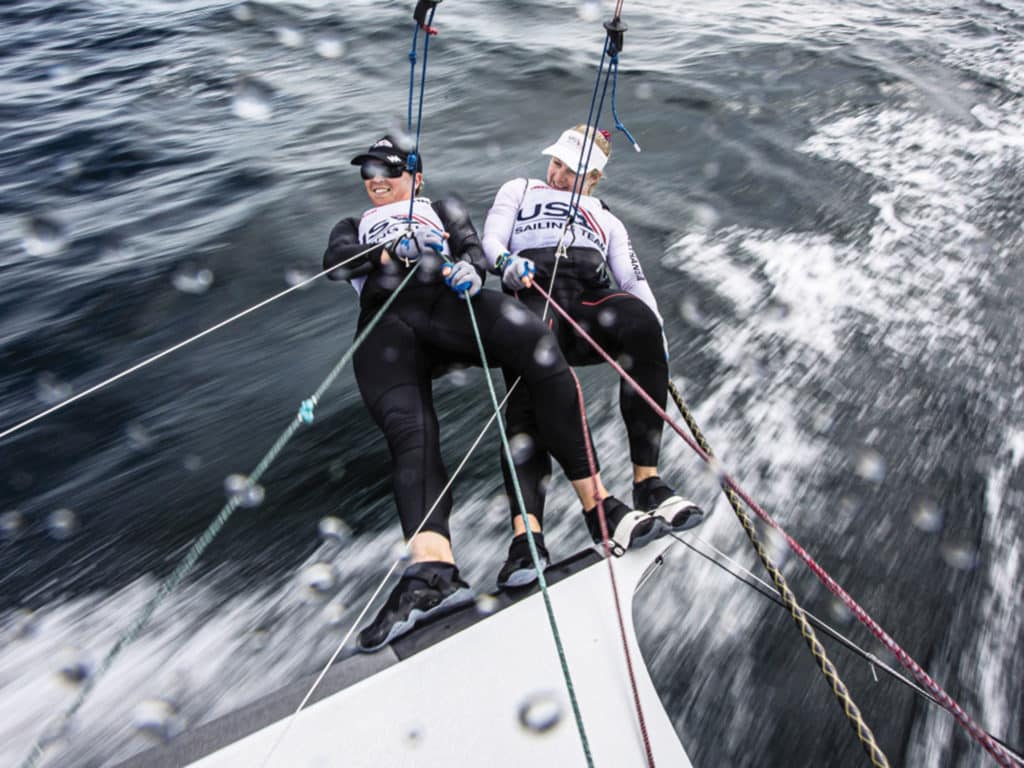
What if you got to the top of the mountain, and it wasn’t there?
John Bertrand lived that nightmare 40 years ago, when the United States boycotted the Olympic Games. A 25-year-old world champion in Lasers and Finns, Bertrand was as close as a sailor can ever be to a sure bet for an Olympic medal—but. All these years later, Bertrand has helped coach Stephanie Roble and Maggie Shea to a place on the 2020 Olympic team. They were supposed to represent in the 49erFX this past summer in Tokyo—but. The stories are the same—but.
They’re not the same. Bertrand’s 1980 chances went from bright to lights out. Roble and Shea are still training for what they hope will be the Games of 2021, and they’re hanging on to the good-news side of a good-news/bad-news equation. When I toss to Roble the “what if” question about 2021—What if it doesn’t happen?—she shoots right back: “We can’t think about that. We have to focus on things we can control. We have to get up every morning and go sailing.”
Shea reflected, “It was an emotional ordeal when we thought 2020 might be canceled instead of postponed, and we were so grateful when US Sailing declared that our qualification would hold.”
When I asked Bertrand what it was like, absorbing the blow of the 1980 boycott, he cited “a lot of amnesia around that.”
And I probably have readers who are hazy as to why the United States would boycott 1980. The short course is that Moscow had the Games, and the boycott was intended to punish the Soviets for invading Afghanistan. (Fortunately, I write for a sailing magazine, so I don’t have to dig into the ironies that come to mind, speaking of foreign adventures in Afghanistan past and present.)
As Bertrand remembers his moment: “News of the boycott came down halfway through the Finn Gold Cup, in New Zealand, and I had to process confusion. I had to process heartbreak. I had to sail out the Gold Cup in a state of anger that athletes were being used as political pawns. But what could I control? It was important to me to win the US Trials, so I kept training hard and didn’t let up. I needed a punctuation mark after so much effort, so much training, such a long pursuit of a vision. But that wasn’t true for everyone.
“The Trials were early in the year, in Newport, and there were good sailors who showed up but didn’t really ‘show up.’ One who did show up was Andrew Menkart. Andrew sailed well. Jud Smith almost won. So it was competitive, but I came through, and once I had my Olympic berth-that-was-not-a-berth, the Europeans were set to be my version of the Games. All the Olympic teams would be sailing the Europeans, and the regatta was scheduled in Helsinki a week before everybody, but the Americans would be transferring to the Olympic sailing site. That was at Tallinn, Estonia, 50 miles across the Gulf of Finland. I was determined to win the Europeans. Instead…instead, I ended up second to Chris Law. It wasn’t a good regatta for me. It was windy. I’m small for the Finn. But the reality is that I came away very dissatisfied. In hindsight, I’m proud that I gave it everything.
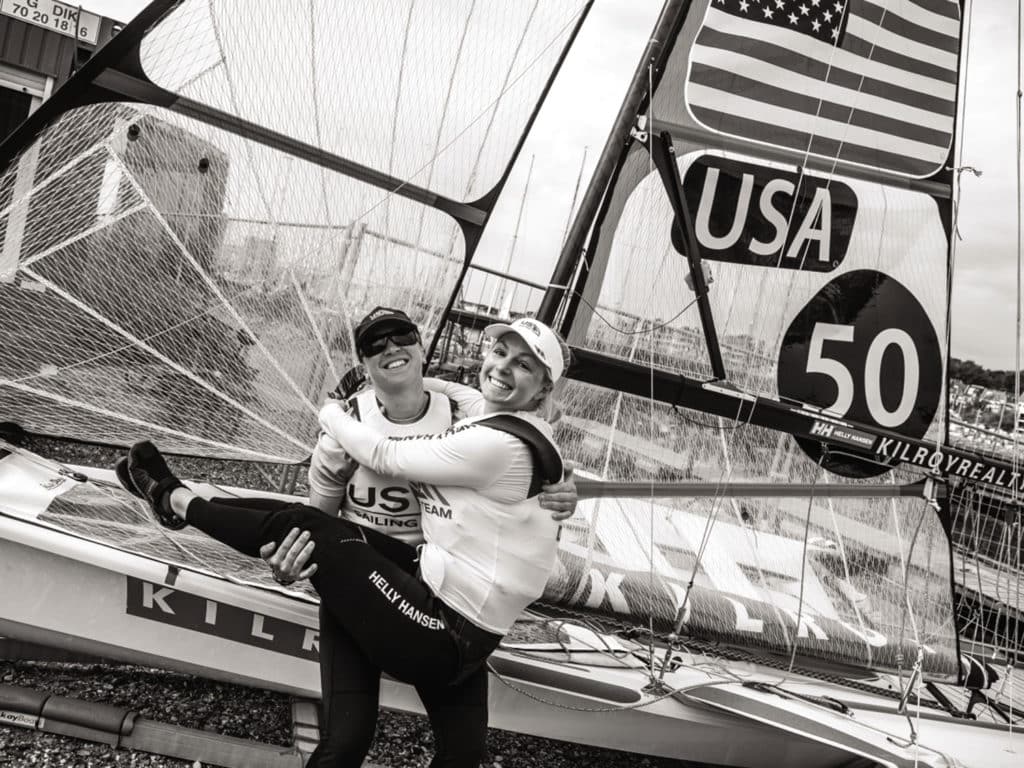
“I would argue that a level of denial can be good for Steph and Maggie,” Bertrand continues. “If there is another delay or cancellation, then, not now, is the time to deal. The girls are equipped for the situation as we know it, and they’re doing their work every day. It’s what they can do.”
The Great Hiccup of 2020, however, has its silver-plated lining. As Shea sees it: “I didn’t realize how exhausting the Trials were until I had been home for a while. For me, that’s Wilmette, Illinois. At first, I was working out angry two or three hours a day—and then I hit a wall. I simply had not recovered from the Trials. I asked Anna Tobias (with Paris Henken, close rivals for selection) about her experience. She said that she took six weeks off between the 2008 Trials and her gold medal in the Radial. In 2012, she took no time off ahead of London, and she didn’t medal. I asked Annie Haeger and Briana Provancha about their Trials in the 470, and they said it was three months before they were ready to fire again. So being forced to go home to family was a blessing. Steph and I hadn’t been out of a boat for any length of time in six or seven years.”
Eventually, in mid-June, after months of lockdown at home, Shea loaded everything into a black 112,000-mile Subaru Forrester “that requires lots of oil but gets the job done,” and headed south to Miami. There she would join Roble, and the two would throw themselves into full-on training for the year to come. “The resources here are awesome,” Shea says. “There was a day in the gym when [NFL running back] Frank Gore—from a distance, wearing a mask—was giving me tips on using my arms to sprint faster. But a black car is an oven. Miami is Tokyo-hot. The water last summer was 86 degrees in the daytime. I was in shock, but from a training-for-Enoshima point of view, it felt real.”
Being in Miami meant access to technology, physical therapy and, most of all, a return to the commitment. “Taking bronze at the Worlds in Australia was a career-best performance,” Roble says. “When we went back to training, thinking 2021, we knew what we could get back to, and as soon as we were underway, I realized how much I had missed the team dynamic. I was back in my happy place.”
The Roble-Shea team came on strong just in time for the FX Worlds. A lot of things clicked into place for a young team that did not start out as favorites and might be making different life choices after the next Games.
Full-time coach Guilia Conti rejoined the effort, distanced, from her home in Italy. Then, in August, through the efforts of the US Sailing Team at one end and Conti at the other, Roble and Shea moved to Italy’s Lake Garda to join their coach. They came out of quarantine in early August and quickly jumped into the scene to prepare for fall events, including the European Championships in October. In Miami, they had kept themselves upbeat about training with technology instead of training partners and competition. Now they could know they were doing it right for real.
Bertrand, whose role had been focused on starting techniques, mode shifting and winning the mental game, observes: “Steph and Maggie are very technical, probably because they have background in match racing and big-boat racing. They like data, and that’s good, but you can get lost in data. Giulia goes more by the seat of the pants, and you need all of that. Performance is a skill, not a mystery. You can train for it. The top 2 inches of your body makes the biggest difference.”
The Roble-Shea team came on strong just in time for the FX Worlds. A lot of things clicked into place for a young team that did not start out as favorites and might be making different life choices after the next Games. “A lot of teams have another quad in them,” Roble says, “but we have time-of-life realities in play. It’s probably in our favor to have more time to train, to get back to our world-championship level, and then begin to experiment with all the little things we ran out of time for when we thought we were going to Japan in 2020. We have time to gain 6 or 8 pounds in the right way, and we’re lucky to have each other. We bring out the competitor in each other. Maggie pushes me to do two more laps, because we can, to lift more, because we can.”
Having experienced gym time alongside these two, I can report that my next Instagram post read: “In touch with my inner wimp.” And having been on the scene in 1980, and then when Bertrand won his silver medal at Los Angeles in 1984, I can make a case for selective memory, and moving on. The 2020 Games were scuttled by a pandemic. The 1980 boycott was a political decision that yielded little gain for a lot of pain. Ultimately, what did the boycott mean to Bertrand? “It’s probably what turned me into a justice warrior,” he says. “That’s a different story, but I’m proud to see myself that way.”

